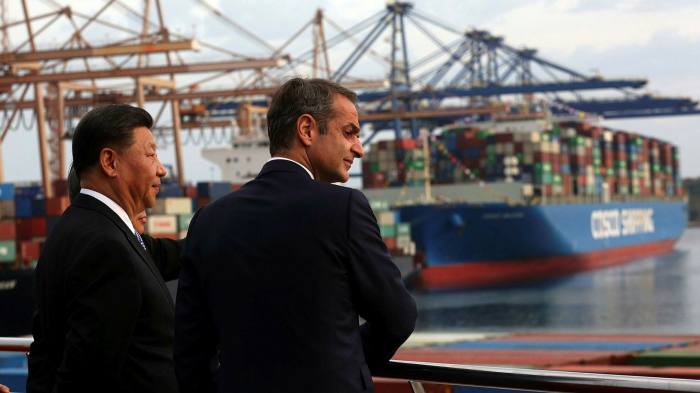ΣΧΟΛΙΟ ΙΣΤΟΛΟΓΙΟΥ : All these EU officials complain about Chinese investments in Greece but had absolutely no problem gutting, destroying and defunding the Greek economy during the crisis which allowed the very condition for China to buy infrastructure to begin with. EU shortsightedness again.
The Chinese-lettered banner hanging over the entrance is one of the few signs that Beijing now controls Europe’s fourth-biggest container port.
Yet this month the Piraeus Port Authority handed a further 16 per cent of its shares to Cosco, cementing its control by the Chinese state-backed shipping group, which bought 51 per cent of the Greek port in August 2016.
The deal has intensified unease in the EU over China’s increasing involvement in European infrastructure and met a wall of opposition over environmental and social concerns, and China’s unmet investment pledges.
“I want the Chinese, but I want them to invest in the right way,” said Vassilis Kanakakis, president of the Greek shipbuilding and ship-repair contractors’ union. “Stay in Greece but work with us.”
The transfer of the additional shares caps five years of negotiations that frequently hung in the balance amid pushback by local interest groups, Greek bureaucracy and diplomatic tensions. Under a preliminary 2016 agreement, Cosco was to receive the extra shares if it completed 11 investment projects worth about €300m by 2021. The list included expanding the port’s capacity to receive more cruise ships and improving its shipbuilding infrastructure. But most remain incomplete.
China has blamed the delays on Greek bureaucracy and local opposition. Piraeus residents have launched a series of lawsuits, claiming Cosco has failed to follow environmental protocols and damaged the marine environment.
“I was born and raised in Piraeus, and this investment is going to destroy my city,” said Anthi Giannoulou, a lawyer and one of the citizens involved in the lawsuits. Local interest groups say investments that have not faced legal challenges have also remained incomplete.
“They haven’t spent a dime here; even when they need to change a lamp, they bring it from China,” said Kanakakis.
The port deal has come under wider EU scrutiny at an awkward time in its relations with China. Faced with an increasingly assertive Beijing, the EU has sought to better protect strategic sectors from Chinese influence. Analysts say the Piraeus deal is frequently cited by officials as a cautionary tale when pushing states to privatise assets.
“This deal with Cosco is concerning. Not only do we now have a much clearer view of the risks that such Chinese investments in strategic infrastructure entail for the EU, but we also know that Cosco is not living up to its contractual obligations,” said Raphaël Glucksmann, a member of the European parliament who chairs a committee to assess foreign interference in the EU’s democratic processes.
Last year Brussels tightened procedures for screening foreign direct investment by foreign subsidised companies making acquisitions or bidding for public tenders in the EU. Container vessels at Piraeus Container vessels at Piraeus. The port deal has come under EU scrutiny, at an awkward time in its relations with China © Simon Dawson/Bloomberg Cosco first acquired its shares in the port in 2008 during the series of sell-offs pressed on Athens by international creditors, including the EU, following the €300bn international bailout of the country after the global financial crisis.
“Looking back it would have been better for the Piraeus port not to be sold,” said Werner Hoyer, president of the European Investment Bank, during a visit to Athens in June.
For China, the port is important to its Belt and Road Initiative, which seeks to build infrastructure linking Asia, Africa and Europe. More than a dozen EU member states have signed up to the BRI, with China betting on making Piraeus a regional distribution centre. During a visit in November 2019, Chinese president Xi Jinping said:
“I have seen in the port today that the [BRI] is not a slogan or tale, but a successful practice and brilliant reality.”
Relations between Greece and China have cooled, however, with the conservative Greek government that came to power two years ago steering a narrow course between western allies and Chinese investors. The US government is following the developments.
It has no influence over the Piraeus deal but has worked to ensure important investments, such as ports in the north of Greece and 5G projects, remain in the hands of western allies. During the past year, Greece has eased out Chinese state-owned enterprises from public tenders and has refused to host a summit in 2022 for the “17+1” grouping of China and central and eastern European countries. Greece joined EU partners in March in condemning China’s human rights violations against its Uyghur minority, and backed sanctions against Beijing.

Δεν υπάρχουν σχόλια:
Δημοσίευση σχολίου